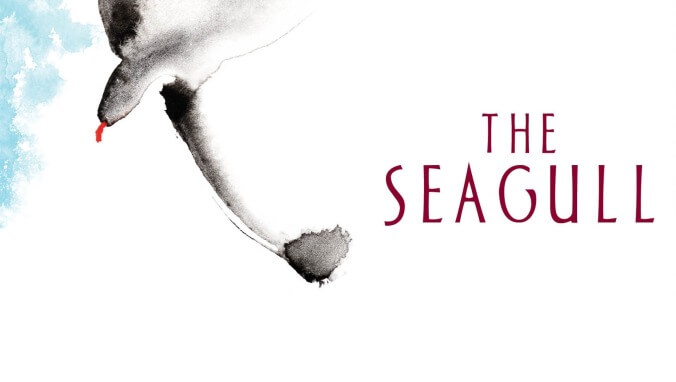The Seagull strains to turn a classic play into a movie

Anton Chekhov’s The Seagull very nearly shares a birthday with cinema itself: The play had its world premiere on October 17, 1896, about a year after the Lumière brothers publicly showed some of the very first motion pictures ever made. Yet there’s never been a definitive cinematic adaptation, nor even a very notable one. (Sidney Lumet’s 1968 The Sea Gull, starring Vanessa Redgrave, Simone Signoret, David Warner, and James Mason, is probably the best-known version, and it’s now all but forgotten.) The latest attempt, directed by Michael Mayer (A Home At The End Of The World, Flicka), mostly demonstrates once again that Chekhov’s masterpieces are ideally designed for the stage—which is where Mayer has mostly worked, in fact. He’s assembled a terrific cast and mostly stayed out of their way, but the result still feels frustratingly arm’s-length, lacking the odd electricity of Louis Malle’s semi-staged Vanya On 42nd Street.
Not that this is a scrupulously faithful adaptation, by any means. Tony Award-winning playwright Stephen Karam, who penned the screenplay, has trimmed a hefty amount of Chekhov’s dialogue, creating a slightly more modern feel even though the action still takes place in late 19th-century Russia. For those unfamiliar with the play, its theme was perhaps most eloquently expressed by the J. Geils Band: Love stinks, yeah yeah. On a lakeside country estate, everyone’s desire is unrequited: Dweeby schoolteacher Medvedenko (Michael Zegen) pines for the depressive Masha (Elisabeth Moss), who’s hot for aspiring playwright Konstantin (Billy Howle), who can’t stop thinking about girlfriend Nina (Saoirse Ronan), who’s irresistibly drawn to famous author Boris Trigorin (Corey Stoll), who’s ostensibly involved with renowned actress Irina Arkadina (Annette Bening), who’s winding down a lifelong love affair with herself. Betrayals and heated arguments lead to multiple suicide attempts, as well as the deployment of a literary symbol so blatant that the characters themselves openly debate its meaning. (It’s technically not a seagull. That’s a mistranslation. They’re on a lake.)
Despite usually being classified as a comedy, The Seagull is far more despairing than it is funny. To say that there’s not a happy ending would be putting it mildly. Mayer and Karam perversely opt to begin with the conclusion, dramatizing much of Act IV (which takes place two years after the rest) before flashing back to Acts I–III. This chronological tinkering—in concert with shots that often shift focus to show characters observing others from a distance as they talk, a visual strategy all but impossible to achieve onstage—arguably makes The Seagull feel a bit more cinematic. It does so, however, at the expense of clarity, since Chekhov intended audiences to know these people intimately when they reconvene, not struggle to work out their complicated relationships. The switcheroo also risks tedium, as most of the Act IV scenes get laboriously repeated in the final minutes, when dramatic tension should be mounting.
Maybe that’s not a huge problem, though, since the film will appeal mostly to theater buffs curious to see these particular actors in the roles. Stoll, underplaying shrewdly, makes Trigorin less haughty and more sympathetic than usual; his offbeat performance brings out the best in Ronan during their scenes together, though she never quite captures Nina’s fatal self-deception. Bening and Moss are as expert as one would expect, respectively flamboyant and morose, but neither transcends standard interpretations in the way that, say, Julianne Moore did in Malle’s Vanya (or as Romola Garai reportedly did onstage as Nina). Howle, by far the least famous member of the main cast (he had a small role in Dunkirk), seems out of his depth. All in all, it’s unlikely that anyone encountering The Seagull for the first time via this movie would fully grasp why it’s an enduring classic. That should hardly be a surprise, though. When great narrative works resist memorable screen adaptation for more than a century, there’s generally a reason.